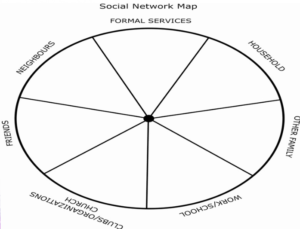Blog
Five Domains of Mentoring
Our Thoughts

There may be a common stereotype that there is little hope for children from vulnerable backgrounds to break out of their existing cycles, but in truth, they can have real advantages compared to their peers.
The fact that they have to put in more effort and work harder to succeed contributes to valuable intrinsic advantages that they will carry through life.
When they are given the right support early on and enter into adulthood, they not only would have academic knowledge gained (like their peers would have), but also inner strength, grit, and knowledge that they gained from the mountains they had to climb growing up (something their peers may lack at the same point in time).
Mentoring is one way to support building these foundations, and it can be a vague concept for many.
We have broken it down into five focus areas below which you can discuss and guide your mentee through. We hope this provides structure as you prepare your mentoring sessions or start on your mentoring journey. 😊
1. Education
Although education is not the end-all-and-be-all, it does open doors and increase opportunities in their futures. Encouraging your mentee to attend school regularly, be engaged during lessons, set goals with them, and motivate them to achieve their goals are great ways to guide them in this area.
Take time to listen if they share any challenges faced and also guide them on navigating these challenges based on your own experiences.
If you have concerns or need further support, remember you can always reach out to one of the staff or your mentor support group. We are here for you!
2. Financial Literacy and Values
This is an area a lot of us might have wished was taught in school!
Helping your mentee develop the right mindset, habits, and knowledge from a young age go a long way in setting good foundations in the long run, such as being financially independent and/or debt-free in adulthood.
Below are some topics you could discuss with your mentee to help them understand finance and have a better grasp of it.
- How is money earned
- Budgeting
- Being responsible and managing their pocket money
- Difference between their needs and wants
- Importance of saving
- Importance of spending wisely
- Interest rates, inflation and investment options (Usually more suited for older mentees)
3. Healthy Coping Outlets
It is especially helpful to discuss and identify people your mentee trust and can turn to, activities to do, and/or actions to take, during challenging times.
This prepares them in advance so they know who to confide in or what they can do when they are overwhelmed, instead of turning to unhealthy coping alternatives.
Below is a simple chart that can help kick start this discussion.
Reference material : A social network map can help identify trusted key figures for your mentee (Tracy & Whittaker, 1990)

4. Vision and Purpose
Most children and youths grow up having aspirations largely based on the people they know, such as their parents or peers. Some children may not have the privilege of having consistent or healthy adult figures in their lives, which may then narrow down what they know.
By exposing your mentee to different education and career options, and even your past experiences, this expands their horizon on what is available and the different paths they could choose.
Remember to also discuss ways and action plans to get to their vision and goals. The more options they are aware of early on, the better decisions they can make.
5. Intrinsic Skills (Character Traits and Social Skills)
Having good character traits, such as resilience, grit, self-motivation, conscientiousness, are crucial in achieving success later in life.
Working through problems and issues with your mentee patiently, encouraging and challenging them to pick themselves up when they fall and persist on, and even doing activities together such as sports, will help them develop these traits.
Winning is great and knowing how to fail well is perhaps even more important for one to progress strongly in life.
Besides character traits, children and youths with good social skills have often been linked to job success, independence, and emotional well-being in their adulthood. You can help your mentee develop skills in the areas below:
- Survival skills: Learning to listen, follow directions, ignore distractions, use nice or brave talk, reward oneself
- Interpersonal skills: Learning to share, ask for permission, join an activity, wait for their turn
- Problem-solving skills: Learning to ask for help, apologize, accept consequences, decide what to do
- Conflict resolution skills: Learning to deal and manage teasing, losing, accusations, being left out, peer pressure
Remember to focus on the desired behaviours and outcomes!
___
The five domains listed above are, and not limited to, some areas to guide your mentee through and help them become more well-rounded.
As we have mentioned, you may not see changes right away, but over time, you will see your mentee approach tasks and situations more confidently and with better attitudes.
Not only that, when they see themselves succeed and progress, they will carry this motivation through each stage of their lives!
___
If you like to join us in this movement to help our young ones be stronger, drop us a message here!
Also, if you wish to give and help us run our programmes, please click here. A little goes a long way as we invest in creating stronger tomorrows.
___
References:
- EduGrow for Brighter Tomorrows
- Paul Tough, Helping Children Succeed, 2016
- NASP centre, https://www.naspcenter.org/factsheets/socialskills_fs.html